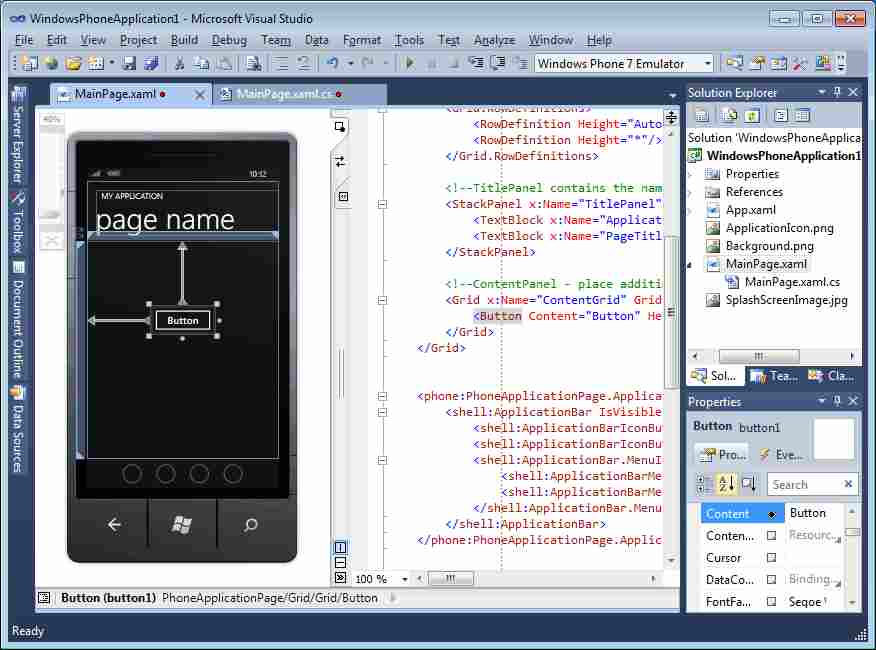| Microsoft's WP7 Push - Developers, developers, developers |
| Friday, 04 March 2011 | |||
|
Microsoft is putting more and more effort into capturing the attention of developers to work on Windows Phone 7. Is this enough?
Microsoft’s drive to increase applications for smartphones based on Windows Phone 7 software is showing up in some interesting ways - rethinks on corporate policies, changes to development environments, even getting friendly with people who are trying to get around copy protection. It’s easy to see why there’s a need for non-traditional thinking. Smartphones based on Windows Phone 7 are a relatively recent entry to the crowded market that is dominated by iPhones and Android-based devices, and if the Windows Phone 7 devices are to succeed they’ll need some killer apps. One way Microsoft is increasing the range is by changing its usually strict rule about its own employees making money outside the company. The thinking seems to be this; Microsoft has lots of developers, and they’ve all been given Windows Phone 7 based devices. So why not get those developers to increase the range of apps? Brandon Watson, director of developer experience for Windows Phone 7, has said that the policy change emerged in part because of a push from his group. “We tend to have strict moonlighting rules but we’ve changed those rules so developers can do this in their spare time, and have the financial benefit and outcome of the work.” We asked Will Coleman, developer lead for Windows Phone 7 in the UK what he thought was behind relaxing the rules. “We recognised the fact that Windows Phone 7 is a major product and there being a pool of talented people in Microsoft, all of whom have Windows Phone 7 kit. The group would like to see good ideas being converted into fully developed apps.“ Developers are even getting help in the form of weekly pizza parties for developers working on code for the Windows Phone 7 platform, and Microsoft is planning ways to publicize their work, including posters and awards of recognition The snag is that in general, if a Microsoft employee carries out fee paying work outside their normal job, even in their spare time, any profits have to go back to Microsoft. In the case of apps developed for Windows Phone 7, Microsoft has relaxed this rule. If employees work in their own time they can keep the resulting intellectual property and most of the revenue, as long as that second job is writing apps for Windows Phone 7-based devices. Any proceeds will be split 70 percent to the developer, 30 percent to Microsoft. Coleman said that this is a pretty standard contract for such cases. The change to the rules has encouraged more than 3,000 employees to register to submit apps, and about 840 have been published so far. “We’re encouraging people across many regions to take part, whether they’re traditional developers or not. For example, here in the UK two of our developer and platform evangelists have started a content to design, develop, and set live a Windows Phone 7 app on the Marketplace in under 6 weeks. They’re total novices in phone development, with no Silverlight or XNA experience. It really isn’t too hard to get an app into Marketplace. The evangelists are blogging their experiences on ubelly.com if you want to catch up with their progress.”
Changes on the wayGetting an app onto Marketplace is one thing, but it doesn’t address some of the other issues around Windows Phone. We asked Will Coleman if and when Microsoft is going to overcome one of the big disincentives for corporate developers contemplating applications for Windows Phone 7 - the $99 charge to run apps. At the moment as a developer you can choose to pay $99 per year which lets you unlock five phones to run your apps. This presents a problem if you’re the IT director of an enterprise and want a WP7 phone app that’s customised specifically for your 1000 employees. In addition there is no sensible way to manage the distribution of your corporate app to the people who need it. Coleman told us that Microsoft hasn’t had feedback that the annual subs fee is expensive (so you’re not shouting loud enough, folks). He went on to tell us that on the enterprise side, the MarketPlace team has been taking soundings on how best to support corporate use, and that Microsoft will be making announcements later in the year, starting at the MIX event in Vegas in April. He didn’t elaborate on what form this might take, but given that MIX is used by Microsoft to showcase forthcoming web technologies, the improvement is unlikely to come in the form of a local Windows Phone App Server, and is more likely to be either the option to have corporate portals, or a more favourable licensing scheme. Of course, if Microsoft doesn’t come up with a more equitable option, someone else will. When Geohot said he was working on a jailbreak for Windows Phone 7, Brandon Watson of the WP7 development team tweeted: "#geohot if you want to build cool stuff on #wp7, send me email and the team will give you a phone - let dev creativity flourish #wp7dev". We asked Coleman what the outcome of this was: “The Geohot guys were working on software to jailbreak the phone, but Brandon reached out to them and they pulled back on the software. They came over to Redmond and met with the product team, and talked about home brew software. As a result there is stuff in the pipeline, and we’ll be making announcements on it, but I can’t say when.” One of the key areas where Microsoft is pushing for more apps for Windows Phone is that of games. The improvements and additions to XNA Game Studio 4 are heavily Windows Phone 7 specific. We asked Coleman how he sees the games sector for Windows Phone 7 developing over the next year or two, and how important is it compared to standalone or corporate apps for the device. “It’s very important, obviously. In all market places, games make up a large portion of what’s downloaded. We’re in a good position with the Xbox titles that are already live to develop an ecosystem. Games developers can use Xbox Live functionality such as points and rewards that take care of some of the heavy lifting for an independent game to become a success. We’re going to have some cool stories in the coming months on how games developers are working on the new platform. Looking forward, now that XNA has better support for Windows Phone 7, I think developers are going to get into designing cross platform experiences, where you might play a game on the phone that has a companion app on the Xbox, maybe related experiences on your laptop. It’s not going to be about simple replication, but about experiences tailored for the different form factors.” Will Microsoft succeed in making Windows Phone 7 a real alternative to its rivals? So far it is arguable that WP7 just hasn't distinguished itself with users. It's just a phone. For developers it represents one of the easiest targets with Silverlight drag-and-drop development is trivial. With XNA game development couldn't be much easier. What is more remarkable is that the development environment is free to download and use. Microsoft might not think that $99 is a lot to pay to deploy to five phones but the sort of radical thinker that they really need may well not agree.
WP7 is the easiest platform to develop for but so far this hasn't translated itself into user appreciation. Perhaps there is a killer app just right for WP7 but perhaps not. More clearly there is a niche that WP7 could fit perfectly but Microsoft doesn't seem to see it - the WP7 the business phone. A good enterprise app deployment and management system could change every thing. After all Android has freedom but no control and iPhone has control but no freedom. Microsoft could do worse than setting WP7 free and put the means to control it in the hands of the user and the enterprise. Related articles: New features in Windows Phone 7 The fall of Windows and the rise of Android Windows Phone 7 - the Pivot Control Windows Phone 7 - the Panorama Control Windows Phone 7 - the Bing Maps Control Windows Phone 7 - Snakes on a Phone Part 1 Getting started with Windows Phone 7 To be informed about new articles on I Programmer, sign up for our weekly newsletter, subscribe to the RSS feed and follow us on Facebook or Linkedin.
Comments
or email your comment to: comments@i-programmer.info |
|||
| Last Updated ( Monday, 13 May 2019 ) |



